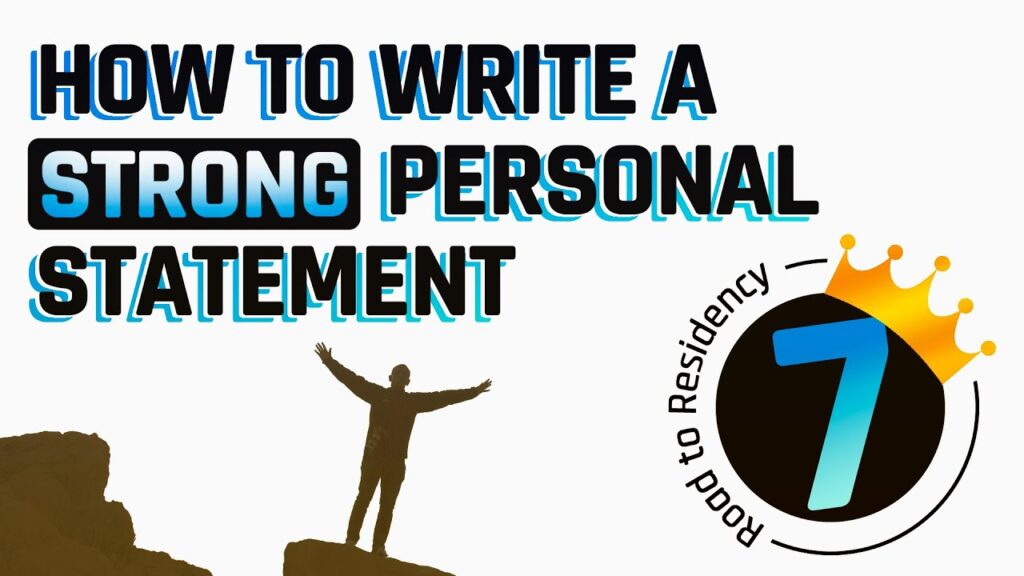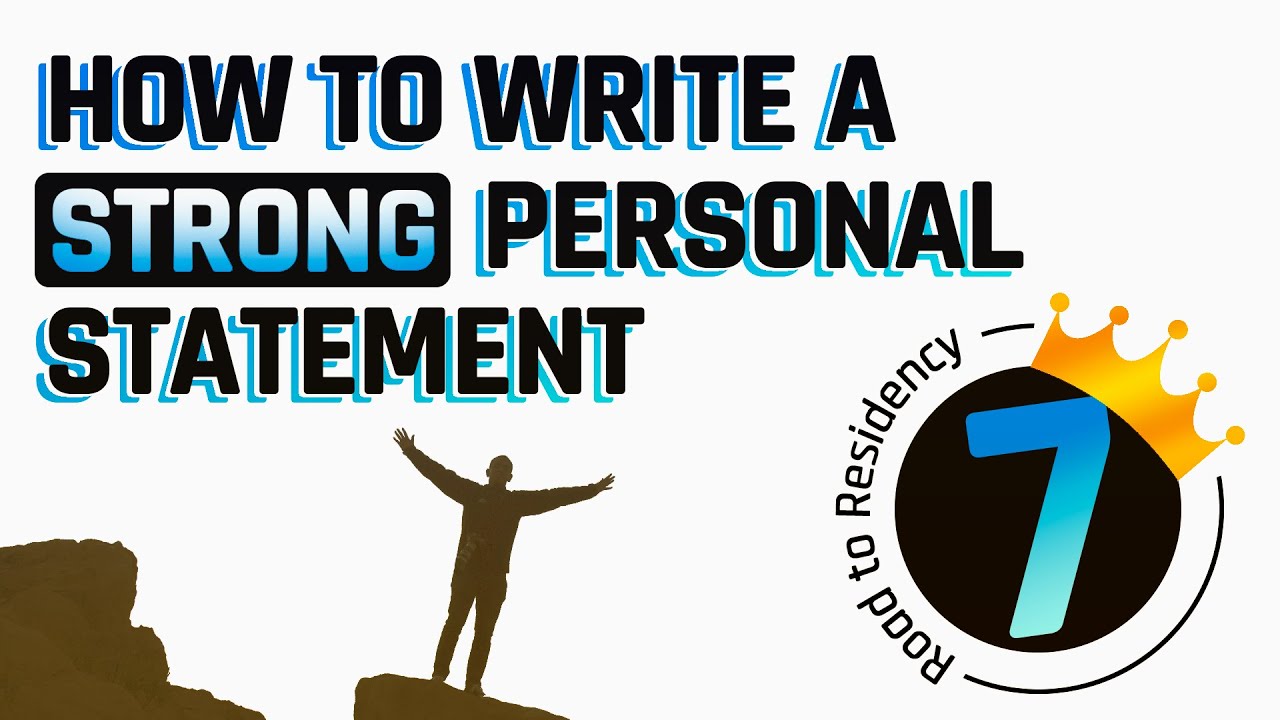
How to Write a Residency Personal Statement: A Comprehensive Guide
Crafting a compelling residency personal statement is a crucial step in securing your desired training position. It’s your opportunity to showcase your personality, experiences, and aspirations beyond your academic record and test scores. This guide provides a comprehensive overview of how to write a residency personal statement that stands out, focusing on clarity, authenticity, and strategic storytelling. The goal is to demonstrate why you are a perfect fit for the program and how you will contribute to their mission.
Understanding the Purpose of a Residency Personal Statement
The residency personal statement serves as a window into your character and motivations. It allows residency program directors to understand who you are beyond your resume. It’s a chance to highlight your unique qualities, experiences, and perspectives, demonstrating your commitment to medicine and your chosen specialty. A well-written statement can significantly enhance your application and increase your chances of securing an interview. Essentially, it answers the question: Why should we choose you?
Key Elements of a Strong Residency Personal Statement
Several key elements contribute to a strong and effective residency personal statement. These include:
- A Compelling Narrative: Your statement should tell a story that captivates the reader and highlights your journey to medicine.
- Clear and Concise Writing: Avoid jargon and overly complex language. Focus on clear and concise communication.
- Authenticity and Honesty: Be genuine and truthful in your portrayal of yourself and your experiences.
- Specific Examples: Support your claims with specific examples from your experiences.
- Strong Conclusion: End with a clear statement of your goals and aspirations for your residency training.
Steps to Writing a Powerful Residency Personal Statement
Brainstorming and Reflection
Before you start writing, take time to brainstorm and reflect on your experiences. Consider the following questions:
- What experiences have shaped your interest in medicine and your chosen specialty?
- What are your strengths and weaknesses as a candidate?
- What are your goals for residency training and beyond?
- What unique qualities or experiences do you bring to the program?
- What challenges have you overcome, and what have you learned from them?
Jot down your thoughts and ideas, and identify the themes and experiences that you want to highlight in your statement. This process is crucial to create a residency personal statement that truly reflects who you are.
Crafting Your Opening Paragraph
Your opening paragraph is your first impression, so make it count. It should grab the reader’s attention and introduce the central theme of your statement. Consider starting with:
- A compelling anecdote that illustrates your passion for medicine.
- A thought-provoking question that engages the reader.
- A brief summary of your journey to medicine and your chosen specialty.
Avoid clichés and generic statements. Be creative and original in your approach. This is your chance to make a memorable first impression. Remember, the goal of your residency personal statement is to stand out.
Developing Your Body Paragraphs
The body paragraphs should provide specific examples and evidence to support your claims. Focus on experiences that demonstrate your skills, qualities, and commitment to medicine. Consider including the following:
- Clinical experiences that have shaped your interest in your chosen specialty.
- Research experiences that demonstrate your analytical and problem-solving skills.
- Volunteer experiences that highlight your compassion and dedication to service.
- Leadership roles that showcase your ability to lead and collaborate.
- Personal experiences that have influenced your perspective on medicine.
For each experience, provide specific details and examples. Don’t just state what you did; explain what you learned and how it has shaped you as a physician. Use the STAR method (Situation, Task, Action, Result) to structure your paragraphs and provide a clear and concise narrative. Ensure your residency personal statement is well-structured and easy to read.
Writing a Strong Conclusion
Your conclusion should summarize your key points and reiterate your commitment to residency training. It should also express your enthusiasm for the program and your desire to contribute to their mission. Consider including the following:
- A brief summary of your goals and aspirations for residency training.
- A statement of your commitment to the program and its values.
- A final thought that leaves a lasting impression on the reader.
Avoid clichés and generic statements. Be specific and genuine in your expression of interest. End on a positive and confident note. This is your final opportunity to convince the program directors that you are the right candidate for their program. A well-crafted residency personal statement conclusion is vital.
Common Mistakes to Avoid in Your Residency Personal Statement
Several common mistakes can weaken your residency personal statement. Avoid the following:
- Clichés and Generic Statements: Use original language and specific examples.
- Grammatical Errors and Typos: Proofread carefully and have others review your statement.
- Lack of Specificity: Provide specific details and examples to support your claims.
- Negative or Complaining Tone: Focus on positive experiences and accomplishments.
- Unprofessional Language: Maintain a professional and respectful tone throughout your statement.
- Exaggeration or Fabrication: Be honest and truthful in your portrayal of yourself and your experiences.
By avoiding these common mistakes, you can ensure that your statement is polished, professional, and effective. Making sure your residency personal statement is error-free is key.
Tips for Editing and Proofreading Your Residency Personal Statement
Editing and proofreading are essential steps in the writing process. Take the time to carefully review your statement for errors in grammar, spelling, and punctuation. Consider the following tips:
- Read your statement aloud to identify awkward phrasing or sentences.
- Ask others to review your statement for clarity, accuracy, and tone.
- Use grammar and spell-checking tools to identify potential errors.
- Take a break from writing and editing to gain a fresh perspective.
- Proofread your statement multiple times before submitting it.
By following these tips, you can ensure that your statement is polished, professional, and error-free. Your residency personal statement should represent your best work.
Seeking Feedback on Your Residency Personal Statement
Seeking feedback from trusted mentors, advisors, and peers can provide valuable insights and perspectives. Ask them to review your statement for clarity, accuracy, and overall effectiveness. Be open to constructive criticism and use their feedback to improve your statement. Consider the following:
- Ask specific questions about your statement, such as “Is my opening paragraph engaging?” or “Are my examples specific enough?”
- Provide your reviewers with clear instructions and guidelines.
- Be open to different perspectives and opinions.
- Thank your reviewers for their time and effort.
By seeking feedback, you can gain valuable insights and perspectives that will help you refine and improve your statement. Getting feedback on your residency personal statement is a crucial step.
Tailoring Your Residency Personal Statement to Each Program
While it’s tempting to use the same statement for all programs, it’s important to tailor your statement to each program individually. Research each program’s mission, values, and specific requirements, and tailor your statement to reflect your interest in their program. Consider the following:
- Highlight specific aspects of the program that appeal to you.
- Demonstrate your understanding of the program’s mission and values.
- Explain how your skills and experiences align with the program’s needs.
By tailoring your statement, you can demonstrate your genuine interest in the program and increase your chances of securing an interview. A tailored residency personal statement shows your dedication.
The Importance of Authenticity in Your Residency Personal Statement
Authenticity is key to writing a compelling residency personal statement. Be genuine and truthful in your portrayal of yourself and your experiences. Don’t try to be someone you’re not or exaggerate your accomplishments. Let your personality shine through and demonstrate your passion for medicine. Residency program directors are looking for candidates who are authentic, genuine, and committed to their chosen specialty. A truly authentic residency personal statement will resonate with readers.
Final Thoughts on Writing a Residency Personal Statement
Writing a residency personal statement is a challenging but rewarding process. By following these tips and guidelines, you can craft a compelling statement that showcases your unique qualities, experiences, and aspirations. Remember to be clear, concise, and authentic in your writing, and seek feedback from trusted mentors and advisors. With careful planning and execution, you can write a residency personal statement that stands out and helps you secure your desired training position. The residency personal statement is a critical part of the application process, so invest the time and effort to make it your best.
Your journey to becoming a physician is unique, and your residency personal statement is your opportunity to share that journey with program directors. Take the time to reflect on your experiences, identify your strengths, and craft a compelling narrative that showcases your passion for medicine and your commitment to your chosen specialty. Good luck!
[See also: Residency Interview Questions and Answers]
[See also: How to Prepare for Residency Interviews]
[See also: Matching into Your Top Residency Program]

